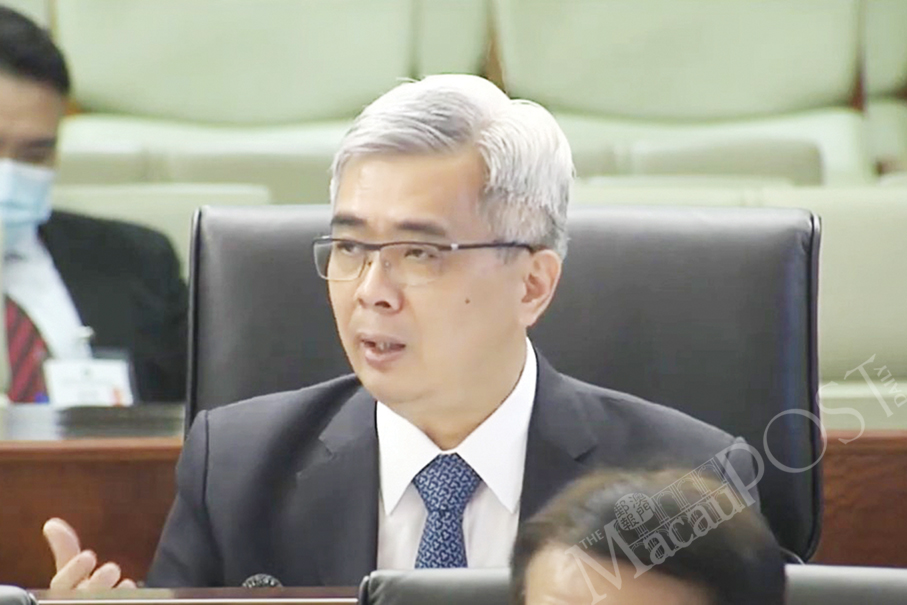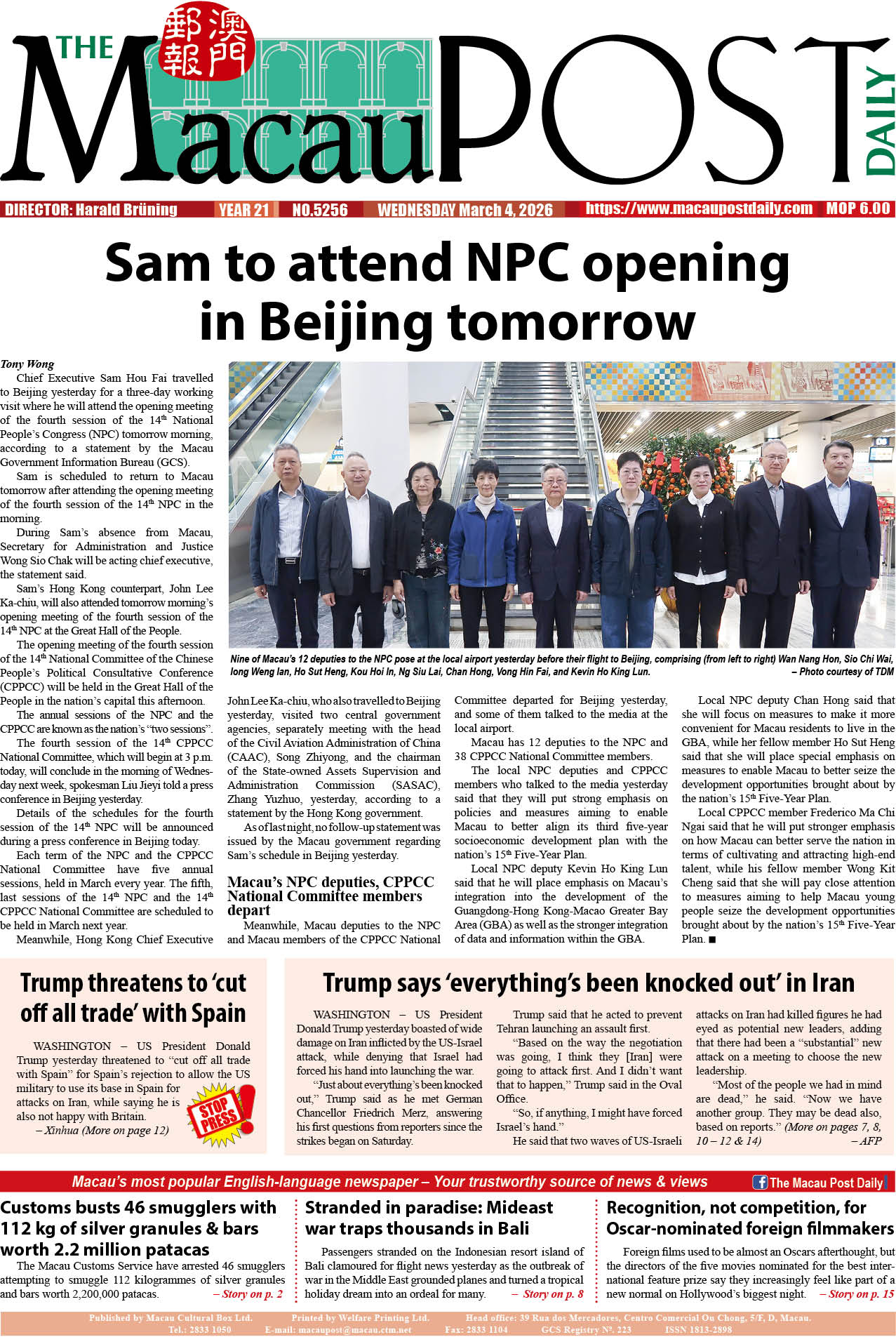Secretary for Security Wong Sio Chak has told lawmakers that the government now expects the city’s new prison in Ka Ho in Coloane, the construction of which got off the ground over a decade ago, to come into use in 2024.
Wong made the remarks during a one-day Q&A session in the legislature’s hemicycle on Friday about his portfolio’s policy guidelines for next year.
Macau’s current prison is located near Coloane Village. The new jail will be located on a hill in the hamlet of Ka Ho.
The new prison project comprising four phases started in August 2010 and was initially scheduled to be completed at the end of 2014, but the project has been hit by repeated delays.
The first phase of the new prison project was completed in 2016, while the second phase was completed in 2019.
According to the website of the Public Works Bureau (DSOP), the government commissioned a building contractor in June 2019 to carry out the new prison project’s third phase, which was then initially scheduled to be completed in May 2021. However, the project’s third phase, according to the DSOP website, is now slated to be completed in February next year, after it has been affected by delays.
Wong told lawmakers late last year that the new prison project’s third phase was expected to be completed in the second quarter of 2022.
During Friday’s Q&A session, Wong noted that the first and second phases of the new prison project have been completed.
Wong said that the new prison project’s third phase, which will include an administration building, a security check building and a training building, was still being carried out, adding that the government now expects the third phase to be completed in February or March next year.
Wong pointed out that the government has commenced the new jail project’s fourth phase, which is the setting-up of the prison’s IT security system, adding that the government now aims for the fourth phase to be completed in one and a half years.
Consequently, Wong said, the government now expects the prison to be able to relocate to Ka Ho in 2024.
In addition, Wong said, the Correctional Services Bureau (DSC) has set up a working group that will prepare the new prison’s relocation and trial operation.
Phasing out foreign prison guards
Meanwhile, Wong also said that the government will continue to “intensively” recruit prison guards from the local job market with the aim of gradually replacing the current prison guards employed from foreign countries with local residents. According to Wong, the jail currently has 649 prison guards, comprising 507 locals and 142 foreign nationals.
Wong noted that since he took office as the secretary for security in December 2014, the government has no longer recruited prison guards from foreign countries. Wong said that the government’s future direction is to “phase out” foreign prison guards and recruit local residents to fill the vacancies, but he admitted that it has been difficult for the government to hire local prison guards.
According to the latest official statistic, the city’s prison in Coloane had 1,421 inmates in August this year, a 7.3 percent year-on-year drop from 1,533 in August last year.
Citywide CCTV system’s 5th phase
Meanwhile, Wong also said during Friday’s Q&A session that the government now aims for the fifth phase of the police forces’ citywide CCTV surveillance system to come into operation next year.
Currently, the citywide CCTV camera system has a total of 1,620 cameras, which have been installed in four phases.
The cameras in the first phase, which came into operation in September 2016, are located in the areas around the city’s various border checkpoints.
The citywide CCTV camera system’s second and third phases came into use at the same time in June 2018. The cameras in the second phase are located on all major roads, while the cameras in the third phase are located at so-called security black spots and tourist attractions.
The cameras in the fourth phase, which came into operation in August 2020, are located in quiet places as well as places with potential security hazards.
Wong said on Friday that the police forces are carrying out the fifth phase of their citywide CCTV surveillance system, which is the installation or replacement of 300 cameras on the system’s existing poles across the city.
The policy secretary added that out of the 300 cameras involved in the fifth phase, 81 will be newly installed on existing poles, while the remainder are merely about replacing some of the current cameras with new ones, or adjusting the angles of some of the current cameras.
Wong also said that the government will commence planning and studying the sixth phase of the citywide CCTV surveillance system.
Parallel traders
Meanwhile, Wong also said that previously many of Macau-Zhuhai cross-border parallel traders were non-resident workers (NRWs), while more recently Macau residents have become the major group engaging in cross-border parallel-trading activities.
According to Wong, 54 percent of 104 Macau-Zhuhai border crossers who have recently been blacklisted by the mainland law enforcement agencies for engaging in cross-border parallel-trading activities are Macau residents.
National security amendment bill
Meanwhile, Wong also reaffirmed that the government will soon submit its local national security law’s amendment bill to the legislature for debate and vote.
Wong also said during Friday’s plenary session that many mainland students who are studying in higher education institutions in Macau were “unwilling” to follow local news, adding that this was one of the reasons why mainland students enrolled in Macau were likely to be defrauded by phone or online scams.
Wong also said that “not many” young local people choose to study cybersecurity as their university subject, because of which, he said, it was currently “very difficult” for both the government and the private sector to hire qualified professionals in the field.

Secretary for Security Wong Sio Chak addresses Friday’s Q&A session about his portfolio’s 2023 policy guidelines in the Legislative Assembly’s (AL) hemicycle. – Photo: GCS









